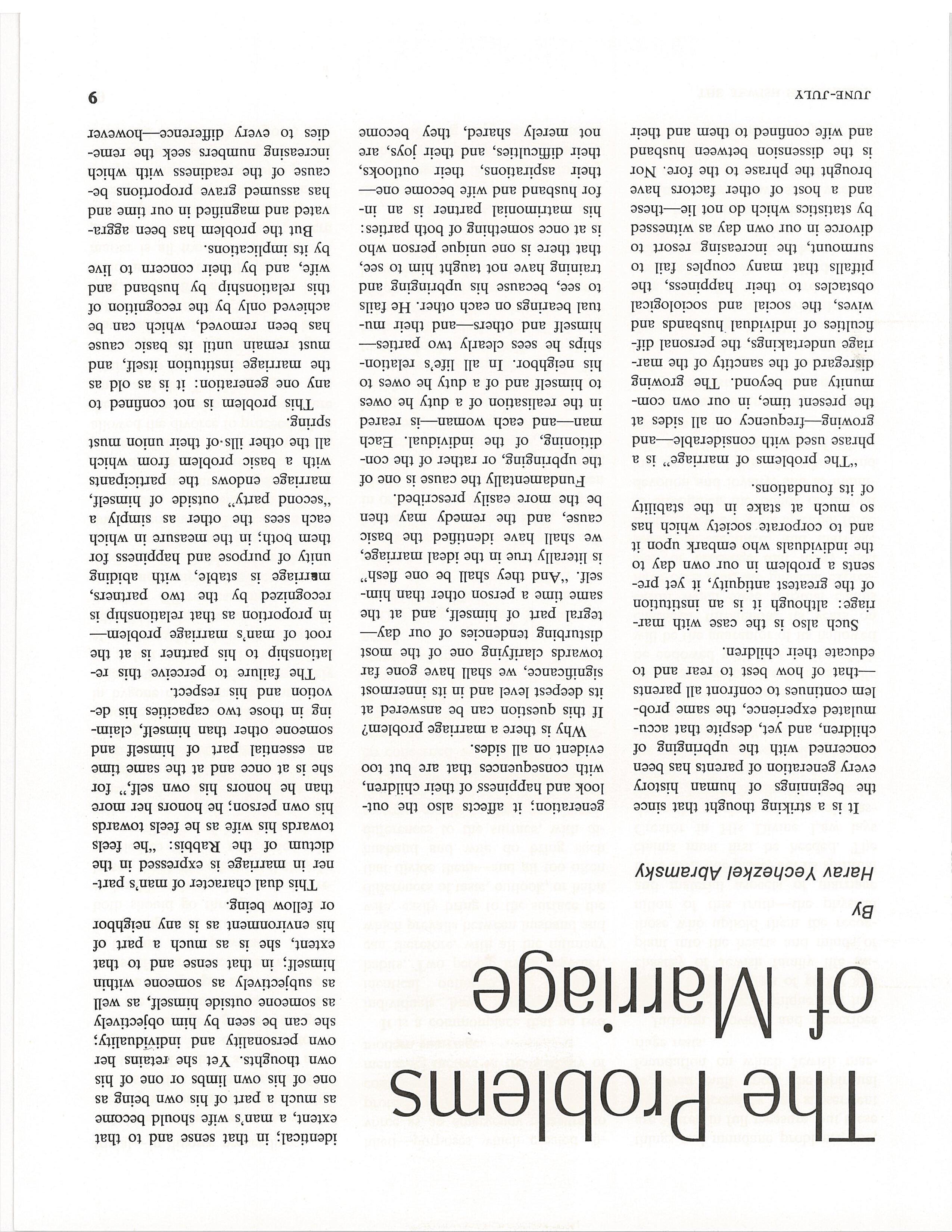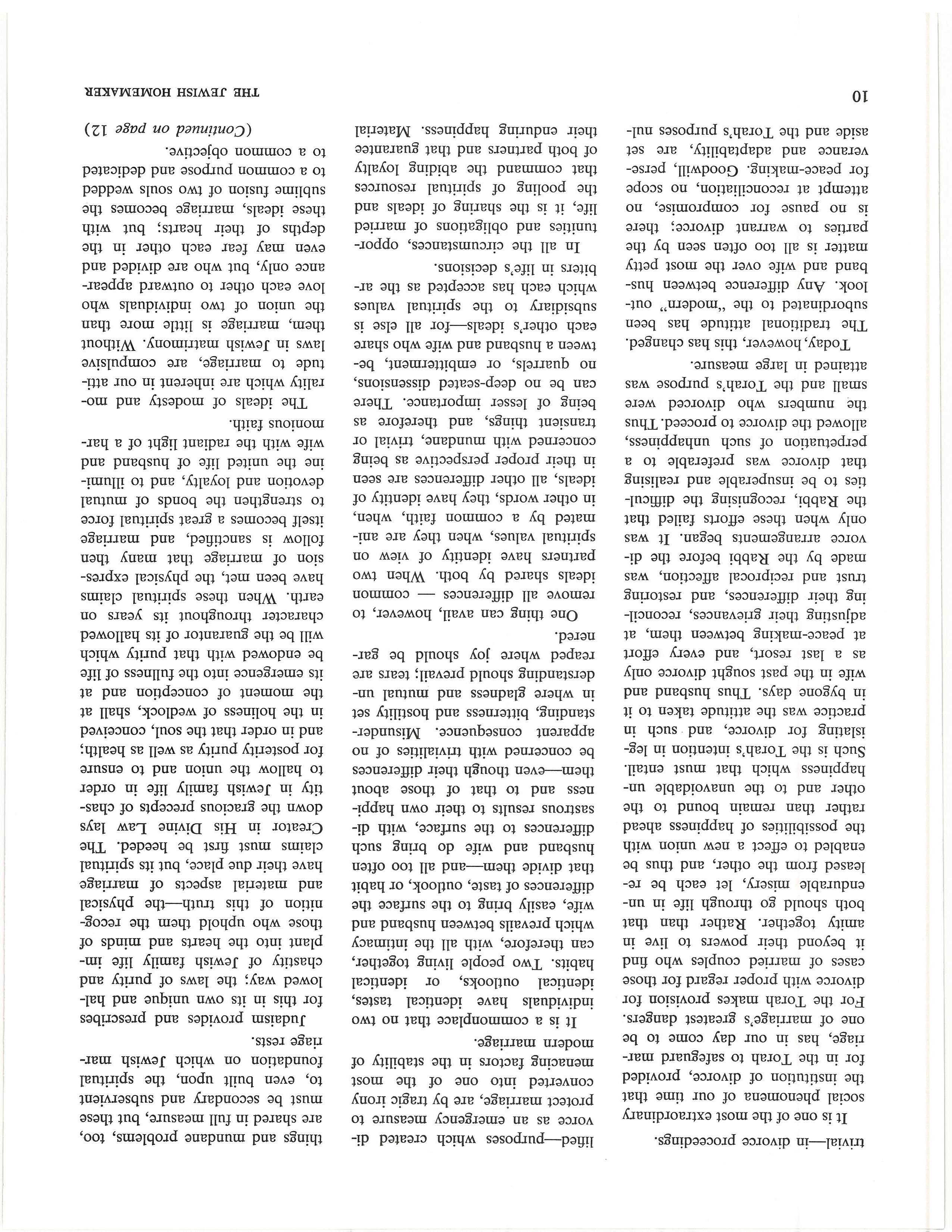
6 minute read
The Problems of Marri6ge
It is a striking thought that since the beginnings of human history every generation of parents has been concerned with the upbringing of children, and yet, despite that accu mulated experience, the same prob lem continues to confront all parents —that of how best to rear and to educate their children.
Such also is the case with mar riage: although it is an institution of the greatest antiquity, it yet pre sents a problem in our own day to the individuals who embark upon it and to corporate society which has so much at stake in the stability of its foundations.
Advertisement
“The problems of marriage” is a phrase used with considerable—and growing—frequency on all sides at the present time, in our own com munity and beyond. The growing disregard of the sanctity of the mar riage undertakings, the personal dif ficulties of individual husbands and wives, the social and sociological obstacles to their happiness, the pitfalls that many couples fail to surmount, the increasing resort to divorce in our own day as witnessed by statistics which do not lie—these and a host of other factors have brought the phrase to the fore. Nor is the dissension between husband and wife confined to them and their generation; it affects also the out look and happiness of their children, with consequences that are but too evident on all sides.
Why is there a marriage problem? If this question can be answered at its deepest level and in its innermost significance, we shall have gone far towards clarifying one of the most disturbing tendencies of our day— tegral part of himself, and at the same time a person other than him self. “And they shall be one flesh” is literally true in the ideal marriage, we shall have identified the basic cause, and the remedy may then be the more easily prescribed.
Fundamentally the cause is one of the upbringing, or rather of the con ditioning, of the individual. Each man—and each woman—is reared in the realisation of a duty he owes to himself and of a duty he owes to his neighbor. In all life’s relation ships he sees clearly two parties— himself and others—and their mu tual bearings on each other. He fails to see, because his upbringing and training have not taught him to see, that there is one unique person who is at once something of both parties: his matrimonial partner is an infor husband and wife become one— their aspirations, their outlooks, their difficulties, and their joys, are not merely shared, they become identical; in that sense and to that extent, a man’s wife should become as much a part of his own being as one of his own limbs or one of his own thoughts. Yet she ~retains her own personality and individuality; she can be seen by him objectively as someone outside himself, as well as subjectively as someone within himself; in that sense and to that extent, she is as much a part of his environment as is any neighbor or fellow being.
This dual character of man’s part ner in marriage is expressed in the dictum of the Rabbis: “he feels towards his wife as he feels towards his own person; he honors her more than he honors his own self,” for she is at once and at the same time an essential part of himself and someone other than himself, claim ing in those two capacities his de votion and his respect.
The failure to perceive this re lationship to his partner is at the root of man’s marriage problem— in proportion as that relationship is recognized by the two partners, marriage is stable, with abiding unity of purpose and happiness for them both; in the measure in which each sees the other as simply a “second party” outside of himself, marriage endows the participants with a basic problem from which all the other ills.of their union must spring.
This problem is not confined to any one generation: it is as old as the marriage institution itself, and must remain until its basic cause has been removed, which can be achieved only by the recognition of this relationship by husband and wife, and by their concern to live by its implications.
But the problem has been aggra vated and magnified in our time and has assumed grave proportions be cause of the readiness with which increasing numbers seek the reme dies to every difference—however trivial—in divorce proceedings.
It is one of the most extraordinary social phenomena of our time that the institution of divorce, provided for in the Torah to safeguard mar riage, has in our day come to be one of marriage’s greatest dangers. For the Torah makes provision for divorce with proper regard for those cases of married couples who find it beyond their powers to live in amity together. Rather than that both should go through life in un endurable misery, let each be re leased from the other, and thus be enabled to effect a new union with the possibilities of happiness ahead rather than remain bound to the other and to the unavoidable un happiness which that must entail. Such is the Torah’s intention in leg islating for divorce, and such in practice was the attitude taken to it in bygone days. Thus husband and wife in the past sought divorce only as a last resort, and every effort at peace-making between them, at adjusting their grievances, reconcil ing their differences, and restoring trust and reciprocal affection, was made by the Rabbi before the di vorce arrangements began. It was only when these efforts failed that the Rabbi, recognising the difficul ties to be insuperable and realising that divorce was preferable to a perpetuation of such unhappiness, allowed the divorce to proceed. Thus the numbers who divorced were small and the Torah’s purpose was attained in large measure.
Today, however, this has changed. The traditional attitude has been subordinated to the “modern” out look. Any difference between hus band and wife over the most petty matter is all too often seen by the parties to warrant divorce; there is no pause for compromise, no attempt at reconciliation, no scope for peace-making. Goodwill, perse verance and adaptability, are set aside and the Torah’s purposes nul lified—purposes which created di vorce as an emergency measure to protect marriage, are by tragic irony converted into one of the most menacing factors in the stability of modern marriage.
It is a commonplace that no two individuals have identical tastes, identical outlooks, or identical habits. Two people living together, can therefore, with all the intimacy which prevails between husband and wife, easily bring to the surface the differences of taste, outlook, or habit that divide them—and all too often husband and wife do bring such differences to the surface, with di sastrous results to their own happi ness and to that of those about them—even though their differences be concerned with trivialities of no apparent consequence. Misunder standing, bitterness and hostility set in where gladness and mutual un derstanding should prevail; tears are reaped where joy should be gar nered.
One thing can avail, however, to remove all differences common ideals shared by both. When two partners have identity of view on spiritual values, when they are ani mated by a common faith, when, in other words, they have identity of ideals, all other differences are seen in their proper perspective as being concerned with mundane, trivial or transient things, and therefore as being of lesser importance. There can be no deep-seated dissensions, no quarrels, or embitterment, be tween a husband and wife who share each other’s ideals—for all else is subsidiary to the spiritual values which each has accepted as the ar biters in life’s decisions.
In all the circumstances, oppor tunities and obligations of married life, it is the sharing of ideals and the pooling of spiritual resources that command the abiding loyalty of both partners and that guarantee their enduring happiness. Material things and mundane problems, too, are shared in full measure, but these must be secondary and subservient to, even built upon, the spiritual foundation on which Jewish mar riage rests.
Judaism provides and prescribes for this in its own unique and hal lowed way; the laws of purity and chastity of Jewish family life im plant into the hearts and minds of those who uphold them the recog nition of this truth—the physical and material aspects of marriage have their due place, but its spiritual claims must first be heeded. The Creator in His Divine Law lays down the gracious precepts of chas tity in Jewish family life in order to hallow the union and to ensure for posterity purity as well as health; and in order that the soul, conceived in the holiness of wedlock, shall at the moment of conception and at its emergence into the fullness of life be endowed with that purity which will be the guarantor of its hallowed character throughout its years on earth. When these spiritual claims have been met, the physical expres sion of marriage that many then follow is sanctified, and marriage itself becomes a great spiritual force to strengthen the bonds of mutual devotion and loyalty, and to ilumi me the united life of husband and wife with the radiant light of a har monious faith.
The ideals of modesty and mo rality which are inherent in our atti tude to marriage, are compulsive laws in Jewish matrimony. Without them, marriage is little more than the union of two individuals who love each other to outward appear ance only, but who are divided and even may fear each other in the depths of their hearts; but with these ideals, marriage becomes the sublime fusion of two souls wedded to a common purpose and dedicated to a common objective.

(Continued on page 12)
THE JEWISH HOMEMAKER







